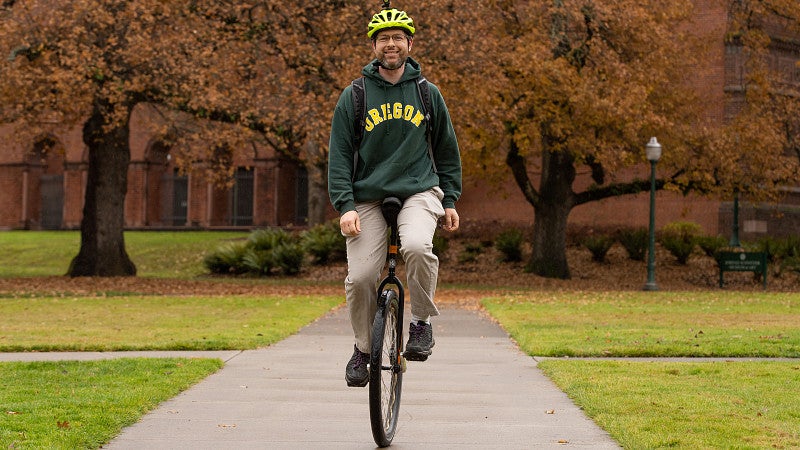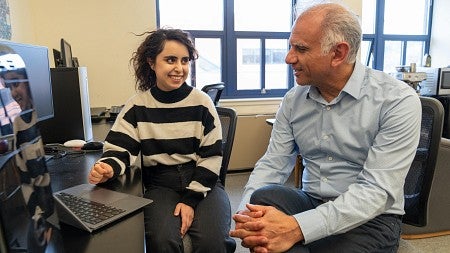
Daniel Lowd Travels Paths of Computer and Information Science
Computer and information science professor shares a lesson in "adversarial machine learning"
By Matt Cooper • Photo by Charlie Litchfield • January 20, 2021
3 min readFrom self-driving cars to Google searches, artificial intelligence—AI—is everywhere. Computers the world over are analyzing data and making decisions without human oversight.
But you still need people to train computers to think for themselves. People like Daniel Lowd.
Lowd specializes in “adversarial machine learning.” Acting as an adversary or attacker, he tries to fool computers by supplying deceptive information, the goal being to help the machines learn for themselves how to avoid manipulation by real attackers.
In a 2018 project, Lowd’s team tested the weaknesses of a “neural text classifier.” These are computer systems that classify text in news stories, movie reviews, or social media comments into categories such as business or sports, or abusive or not abusive to readers.
Because text classifiers are increasingly used to detect spam, fake news, hate speech, and other malicious activity, attackers are increasingly motivated to try to manipulate the classifiers with small, deceptive changes to what they input into these networks.
Lowd’s team tested the vulnerability of state-of-the-art classifiers to changes in just a few characters. For example, they found changing the word “mood” to “mooP” was sufficient to mislead a classifier into labeling a world news story as science-technology. They have also applied these methods to automated translation systems, showing that by tweaking a few characters—say, changing “Psychotherapeut” to “Psy6hothearpeiut”—“therapist” is translated as “psychopath.”
Lowd and his partners are among the first to show how such slight changes can trick these networks. But classifiers can be trained to perform better with manipulated text, making them more difficult to attack, he says.
Cybersleuth
In a new project, Lowd will effectively analyze a crime scene and try to determine whodunit.
One way to sneak spam past a computer’s filters is to make the text so confusing it can’t be recognized as illegitimate. Traditional defenses have focused on trying to improve the filters—but Lowd will look at the problem from the other end, analyzing the “obfuscated spam” that gets through in an effort to identify the software used to camouflage it.
“If we can solve this problem,” he says, “then we can get a better idea of who is trying to trick our [filters] and what techniques they’re using.”
Big wheel
Lowd turns heads on his short commute to and from campus—he rides a unicycle.
He learned the skill as an undergraduate at Harvey Mudd College in California. After years away from it, he returned to one-wheeled travel after moving to Eugene and joining the university in 2009.
“From time to time, my bike would fail,” Lowd says. “A unicycle is the next step in simplicity—you dispense with frivolous things like handlebars and a second wheel.”
Gift for song
If you ever attended one of the “No Shame Eugene” talent shows 10 years ago, you perhaps caught Lowd’s act: he was a hit with his silly songs, including “Otterly Adore You”—an otter love song—and “Walking in the Moonlight,” which is about amorous werewolves.
Song writing “is a fun, creative outlet,” Lowd says. “My most popular song might be ‘Space is Big’—it’s probably the first song I wrote after I learned a few chords on the guitar. It only has three chords but I refined it a bit and, to my surprise, people liked it.”
Matt Cooper is managing editor for Oregon Quarterly.




